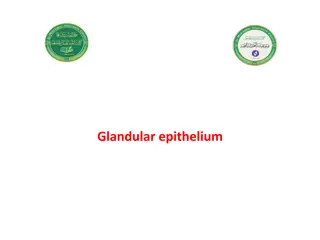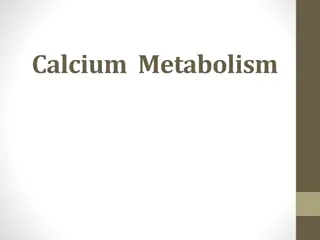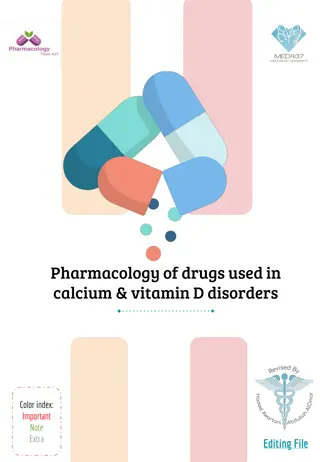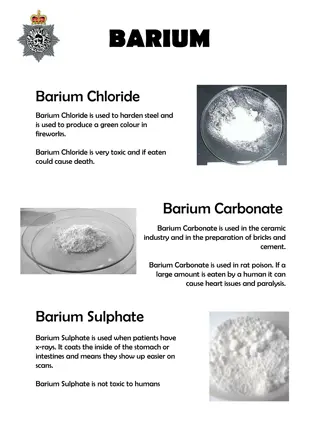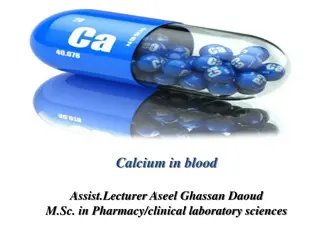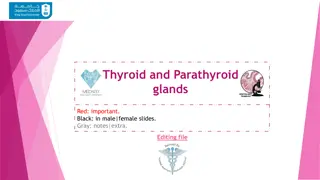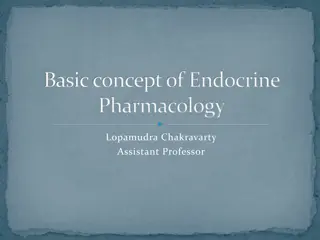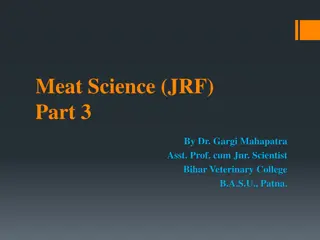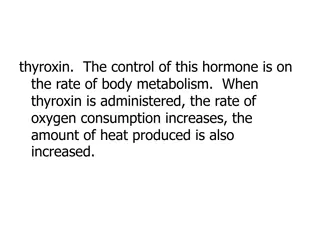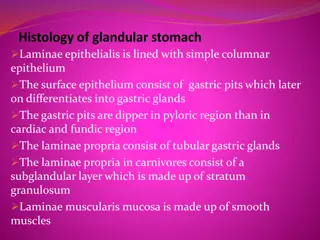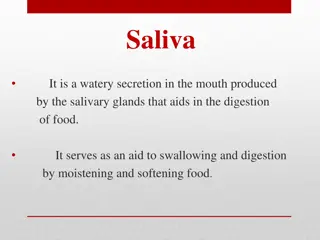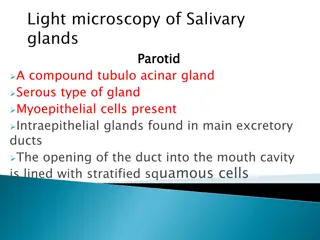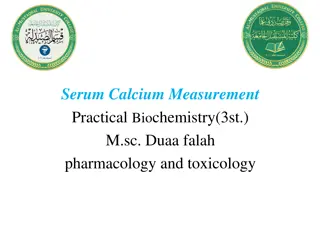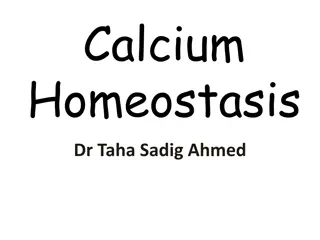Understanding Parathyroid Glands and Calcium Regulation
Parathyroid glands play a crucial role in maintaining the body's calcium levels within a narrow range to support the proper functioning of the nervous and muscular systems. Parathyroid hormone (PTH) regulates calcium concentration in the blood, impacting bone health and other physiological functions. PTH secretion is stimulated by hypocalcemia, and it affects calcium release from bone, reabsorption in the kidneys, and absorption in the digestive tract. The regulatory mechanism involves a G-protein coupled receptor acting as a calcium sensor on parathyroid gland cells.
Download Presentation

Please find below an Image/Link to download the presentation.
The content on the website is provided AS IS for your information and personal use only. It may not be sold, licensed, or shared on other websites without obtaining consent from the author. Download presentation by click this link. If you encounter any issues during the download, it is possible that the publisher has removed the file from their server.
E N D
Presentation Transcript
The major function of the parathyroid glands is to maintain the body's calcium level within a very narrow range, so that the nervous and muscular systems can function properly. Parathyroid glands control the calcium in our bodies-- how much calcium is in our bones, and how much calcium is in our blood. Calcium is the most important element in our bodies (we use it to control many systems), so calcium is regulated very carefully. Parathyroid glands control the calcium.
Parathyroid hormone Parathyroid hormone (PTH) is secreted by the chief cells of the parathyroid glands as a polypeptide containing 84 amino acids. It acts to increase the concentration of calcium (Ca2+) in the blood, whereas calcitonin (a hormone produced by the parafollicular cells (C cells) of the thyroid gland) acts to decrease calcium concentration.
Biosynthesis 1-Pre-Pro PTH: Consisting of 115 amino acids is first formed in polysomes,adhering on the rough ER membrane. 2-Pro-PTH : Before the formation of Pre-Pro PTH is completed ,its N-terminal end products into the lumen of rough ER and a single peptidase of rough ER membrane hydrolyzes the molecule to split off 25 amino acid,and thus Pre-Pro PTH is changed to Pro-PTH having 90 amino acids. 3-PTH : Pro-PTH is transferred to rough ER lumen and moves to Golgi cisternae.Thus PTH formed is packaged and stored in secretary vesicles.
Regulation of PTH secretion The stimulus for PTH secretion ishypocalcemia .There are three specific actions of PTH: 1-it stimulates release of calcium from bone by stimulating bone resorption. 2-PTH decreases the amount of calcium excreted in the urine, by stimulating calcium reabsorption in the kidney. Finally, PTH indirectly promotes calcium absorption by the digestive tract, because it activates the enzyme in kidney cells that produces the hormone 1,25-(OH)2D (the active form of vitamin D).
The sensor on the parathyroid gland cell that detects changes in the ECF calcium concentration is a G-protein coupled receptor that is acalcium receptor. When ECF calcium is high, calcium binds to the receptor and this inhibits PTH secretion. When ECF calcium is low, the receptor is unbound and so there is no inhibition, and PTH secretion occurs.
PTH Effects on Bone PTH has a rapid effect (occurring within minutes), whereby it stimulates osteoblasts to pump Ca++ions out of the fluid surrounding the bone (which has a higher Ca++concentration) and into the ECF. Over a longer time course, PTH stimulates bone resorption. PTH stimulation of osteoblasts causes them to express a signaling molecule that activates osteoclasts.
PTH Effects on Kidney 1-It decreases the loss of Ca++ions in the urine by stimulating Ca++reabsorption. As well as stimulating Ca++reabsorption, PTH also inhibits phosphate reabsorption in the kidney. 2-Stimulate production of 1,25(OH)2D, the active form of vitamin D. A precursor (known specifically as vitamin D3or cholecalciferol) is synthesized in a photochemical reaction in the skin, in response to sunlight.
In kidney disease Inadequate amounts of 1,25(OH)2D are made thus[Ca++](ECF) drops because of a lack of Ca++absorption from the diet. Hypocalcemia stimulates high levels of PTH secretion; this is termed secondary hyperparathyroidism because the problem that causes the hyperparathyroidism is in the kidney, not at the parathyroid gland. Secondary hyperparathyroidism is treated by administering vitamin D and Ca++supplements.
Stimulators Decreased serum [Ca2+]. Mild decreases in serum [Mg2+]. An increase in serum phosphate (increased phosphate causes it to complex with serum calcium, forming calcium phosphate, which reduces stimulation of Ca- sensitive receptors (CaSr) that do not sense Calcium phosphate, triggering an increase in PTH). Inhibitors Increased serum [Ca2+]. Severe decreases in serum [Mg2+], which also produces symptoms of hypoparathyroidism (such as hypocalcemia).
Hyperparathyroidism Primary hyperparathyroidism is the result of parathyroid gland disease, most commonly due to a parathyroid tumor (adenoma) which secretes the hormone without proper regulation. Secondary hyperparathyroidism is the situation where disease outside of the parathyroid gland leads to excessive secretion of parathyroid hormone. A common cause of this disorder is kidney disease - if the kidneys are unable to reabsorb calcium, blood calcium levels will fall, stimulating continual secretion of parathyroid hormone to maintain normal calcium levels in blood.
Hypoparathyroidism Inadequate production of parathyroid hormone typically results in decreased concentrations of calcium and increased concentrations of phosphorus in blood. Common causes of this disorder include surgical removal of the parathyroid glands and disease processes that lead to destruction of parathyroid glands. The resulting hypocalcemia often leads to tetany, and can be acutely life-threatening. Treatment focuses on restoring normal blood calcium concentrations by calcium infusions, oral calcium supplements and vitamin D therapy.
A test for parathyroid hormone (PTH) is done to: 1-Help identify hyperparathyroidism. 2-Find the cause of an abnormal blood calcium level. 3- Check to see whether a problem with the parathyroid glands is causing the abnormal calcium level. 4-Watch for problems in people who have chronic kidney disease.



